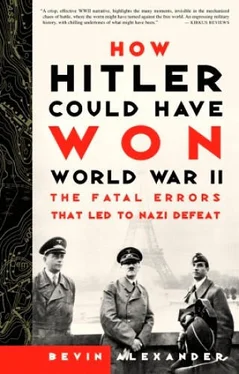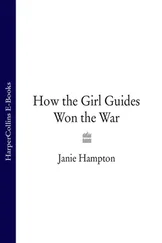Erich von Manstein had won the campaign in the west in 1940 by convincing Hitler to concentrate his armor. Now, at the moment of Germany’s greatest military peril, Hitler was dispersing his armor—all across the map. Furthermore, he kept a firm rein on most of these divisions, intending to direct the battle from Berchtesgaden.
If, instead, three or four fast divisions had been stationed directly behind the beaches at each of the potential sites, they very likely could have crushed any invasion on the first day.
From March 1944 onward Hitler had a “hunch” the invasion would come at Normandy, though he thought it would be only a diversion to the main assault on the Pas de Calais. He arrived at this hunch because Americans were concentrated in southwest England, thus were closer to Normandy, and because an exercise took place in Devon on a beach similar to Norman beaches. Rommel came around to the same belief, but, despite frantic efforts, it was too late to build adequate defenses along the Norman coast.
Whether the landing on Normandy (Operation Overlord) was actually going to take place was the call of the three Allied leaders, not the generals. They did so at the Teheran conference in late November 1943.
Roosevelt was not as set on Overlord as Marshall, but if Stalin wanted it, he would demand it. Stalin still had the power to sign a cease-fire with Hitler. This was increasingly unlikely with the German retreat after Operation Citadel, but Roosevelt sought to avoid a separate peace at all costs. Beyond that, he was seeking a “constructive relationship” with Stalin after the war—a Soviet Union as a responsible member of the world community, not an agent of further disorder and war.
Consequently, at Teheran, when Stalin contested diversions in the Mediterranean that Churchill was seeking, Roosevelt announced he opposed any delay in the cross-Channel invasion. With that, the die was cast for Overlord.
Because American forces would predominate in an invasion of France, Roosevelt insisted that the commander be an American. Churchill had to accept, dashing the hopes of Alan Brooke to get the job. In partial compensation, Churchill arranged for British General Sir Henry Maitland Wilson to become supreme commander of the Mediterranean theater.
Early in December on his return from Teheran, FDR met Dwight Eisenhower at Tunis. The president was scarcely seated in the automobile when he said: “Well, Ike, you are going to command Overlord.”
General Marshall had expected to receive this choicest of all commands, and Roosevelt had planned to give it to him. But he finally decided that Marshall could not be spared, telling him: “I could not sleep at ease if you were out of Washington.”
Eisenhower, fifty-four years old, was probably the best possible choice. He was not a combat commander, but he was able to build consensus and cooperation among two quite different sorts of armies and officers. He quelled disputes and animosities by reason and with what Max Hastings called an “extraordinary generosity of spirit to his difficult subordinates.”
Eisenhower secured British Air Chief Marshal Sir Arthur Tedder as his deputy. He had hoped to get General Alexander, whom the Americans liked despite his critical views of American soldiers, as British ground commander. But Alan Brooke favored Montgomery, and Churchill, deciding he needed Alexander in the Mediterranean, gave Montgomery the job. For American ground commander, Eisenhower selected Omar Bradley, a stable, discreet, but colorless fifty-year-old West Pointer. Because the slapping incidents in Sicily had revealed a serious character flaw in George Patton, Eisenhower refused to consider him for any post higher than commanding an army.
An enormous buildup commenced in southern England, and by the spring of 1944 much of the country had become a vast military encampment. Tank and vehicle parks covered thousands of acres. Most obvious were the troops who made up one French, one Polish, three Canadian, fourteen British, and twenty American divisions.
To permit rehearsal of landings with live ammunition, the British evacuated the entire population of a 25-square-mile region along the Devonshire coast between Appledore and Woolacombe. Great tented cantonments arose in the assembly areas. The initial American landing force comprised 130,000 men, with 1.2 million more to follow in ninety days. With them would go 137,000 wheeled vehicles, 4,200 fully tracked vehicles, and 3,500 cannons. Also assembled were prodigious amounts of supplies. Each American soldier in Normandy got six and one-quarter pounds of rations a day, each German three and one-third. On the other hand, a German rifle company’s small-arms ammunition scale was 56,000 rounds, an American company’s 21,000.
British Lieutenant General Frederick Morgan, charged with drawing up an invasion plan, had put his finger on Normandy by the spring of 1943. The Pas de Calais defenses were too powerful, and the Germans might bottle up an invasion of Cherbourg and the Cotentin peninsula. This left only the beaches of Normandy within range of fighter cover. But the final decision came only when a British idea for two artificial harbors (Mulberries) turned out to be feasible, and work began apace.
If the Germans knew the Norman beaches were the site, they could build up overwhelming force there and smash the landing. It was imperative to deceive them into believing the main attack would come at the Pas de Calais, and that Normandy was only a feint or diversion.
Out of this arose the most brilliant Allied deception of the war (Operation Fortitude). The Germans had fingered Patton as the most aggressive, inventive, and determined general among the western Allies, and did not think the little matter of his slapping around a couple of enlisted men would make much difference. Patton, they were sure, would lead the assault forces into France. Therefore, when Eisenhower called him to Britain on January 22, 1944, and named him to command 3rd Army, counterintelligence spread the word that he was actually commanding the “1st U.S. Army Group” that would land in the Pas de Calais. The counterspies set up radio nets of this fictitious army group with lots of fake traffic and created the impression that a real army group was busily preparing for action. The Germans kept their strongest army, the 15th, to guard the Pas de Calais.
The Allies had decided to land at Normandy, but this was only the first step. Shortly after arriving in England on January 14, 1944, Eisenhower established the strategy to defeat Germany. He directed that after breaking out of Normandy the Allies were to advance on Germany on a broad front with two army groups—the British on the left, the Americans on the right. The British were to receive preference in order to capture the ports of Belgium, especially Antwerp, which were vital to build up supplies necessary to break into Germany, and to seize the Ruhr, the main center of German industry, which lay east of southern Holland along the Rhine around Düsseldorf, Duisburg, and Essen.
Eisenhower also ordered a massive bombing offensive against transportation centers in Belgium and France to reduce German ability to reinforce Normandy and to carry on a war in France. To minimize casualities among French and Belgian civilians, the Allies warned inhabitants in advance to move away from specific targets. The Allied aircraft did not target rail and road lines to Normandy alone, but bombed other sites, especially the Pas de Calais.
Sir Arthur Harris, chief of RAF Bomber Command, wanted to continue area or terror nighttime bombing of German cities, while Carl Spaatz, U.S. Strategic Air Forces commander, urged concentration on destroying synthetic fuel plants and refineries to immobilize German panzers, vehicles, and aircraft. However, Eisenhower overruled them.
Читать дальше


![Джонатан Димблби - Barbarossa - How Hitler Lost the War [calibre]](/books/385421/dzhonatan-dimblbi-barbarossa-how-hitler-lost-the-w-thumb.webp)









